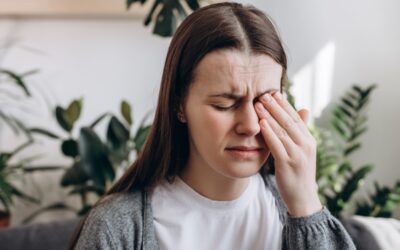Dry eye is a common condition that affects millions of people every day. It can cause discomfort, irritation, and even vision problems if left untreated. Many people suffer from dry eye without knowing the underlying cause, which can make finding the right treatment challenging. Learn about the common causes of dry eye and find effective treatment options for lasting relief.
Environmental factors
One of the main culprits behind dry eye is environmental factors. Spending long hours in front of a computer screen or under air conditioning or heating systems can reduce tear production and cause your tears to evaporate too quickly, resulting in dryness and irritation. Additionally, exposure to cigarette smoke, wind, dust, allergens, and low humidity levels can also irritate the eyes and exacerbate dry eye symptoms. To combat this, try using a humidifier in dry indoor spaces, taking regular breaks from screens, and wearing sunglasses outdoors to protect your eyes.
Aging
As we age, our bodies undergo various changes, including a decrease in tear production. This natural aging process can lead to dry eye syndrome in older individuals. If you are experiencing dry eye symptoms as you get older, it is important to speak with your eye doctor about possible treatment options.
Medical conditions
Certain medical conditions such as autoimmune diseases (e.g., Sjögren’s syndrome), diabetes, thyroid disorders, and rheumatoid arthritis can also trigger dry eye symptoms. These conditions may affect the quality or quantity of tears produced by your eyes, leading to chronic dry eye and irritation. Managing these underlying medical issues is essential in treating dry eye effectively.
Medications
Some medications have side effects that can cause dry eye as a result of decreased tear production or changes in tear composition. Common culprits include antihistamines, decongestants, antidepressants, acne medications, birth control pills, hormone replacement therapy drugs, and certain blood pressure medications. If you suspect that your medication is causing your dry eye symptoms, ask your healthcare provider about alternative options.
Hormonal changes
Lastly, hormonal changes can also play a role in causing or exacerbating dry eye symptoms. Women may experience fluctuations in tear production during pregnancy or menopause due to hormonal shifts. Birth control pills that contain estrogen may also affect tear film stability.
In conclusion, understanding what causes dry eye is essential for finding relief from this uncomfortable condition. You should contact an eye doctor if your dry eye symptoms persist despite taking over-the-counter remedies or home remedies like warm compresses or artificial tears. At Northwest Hills Eye Care, our dry eye specialists in Austin, Texas can provide you with customized treatment options tailored to your individual needs. Contact us today to schedule an evaluation and find the best treatment for your symptoms!



